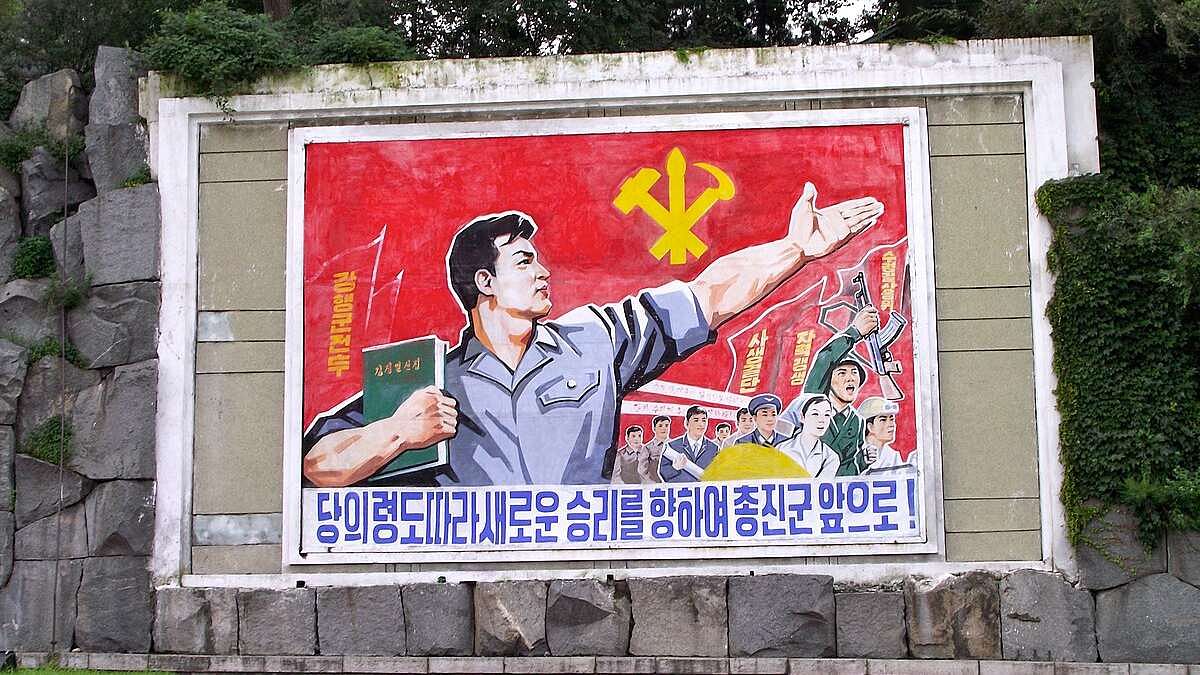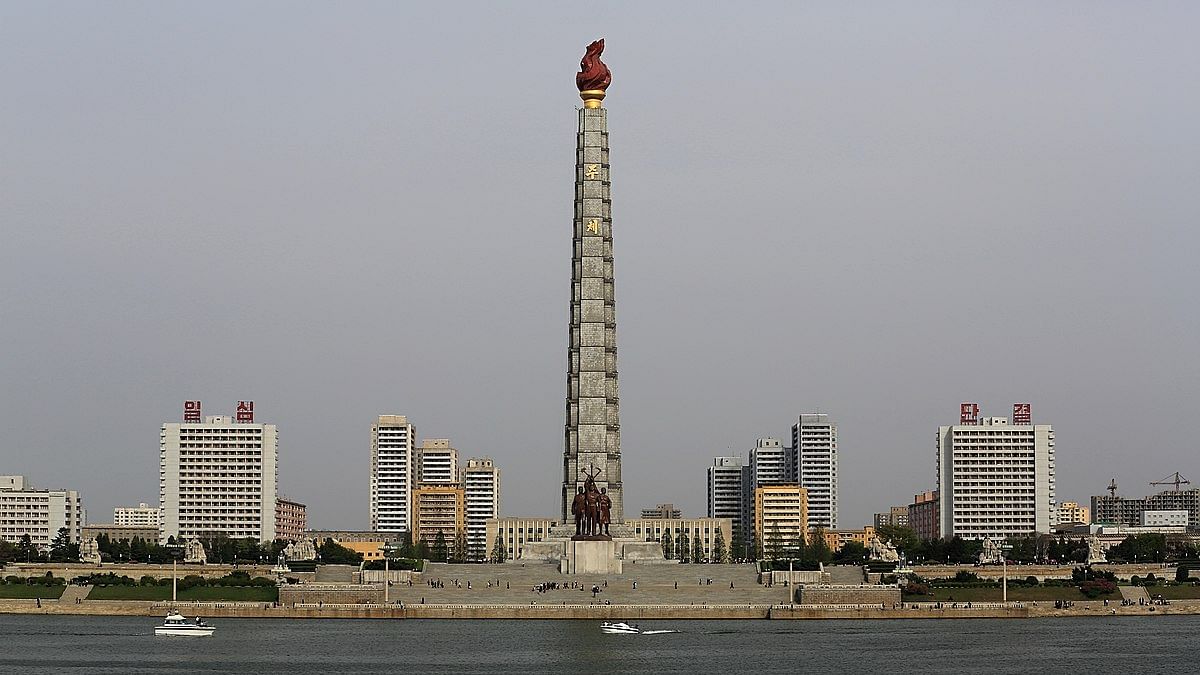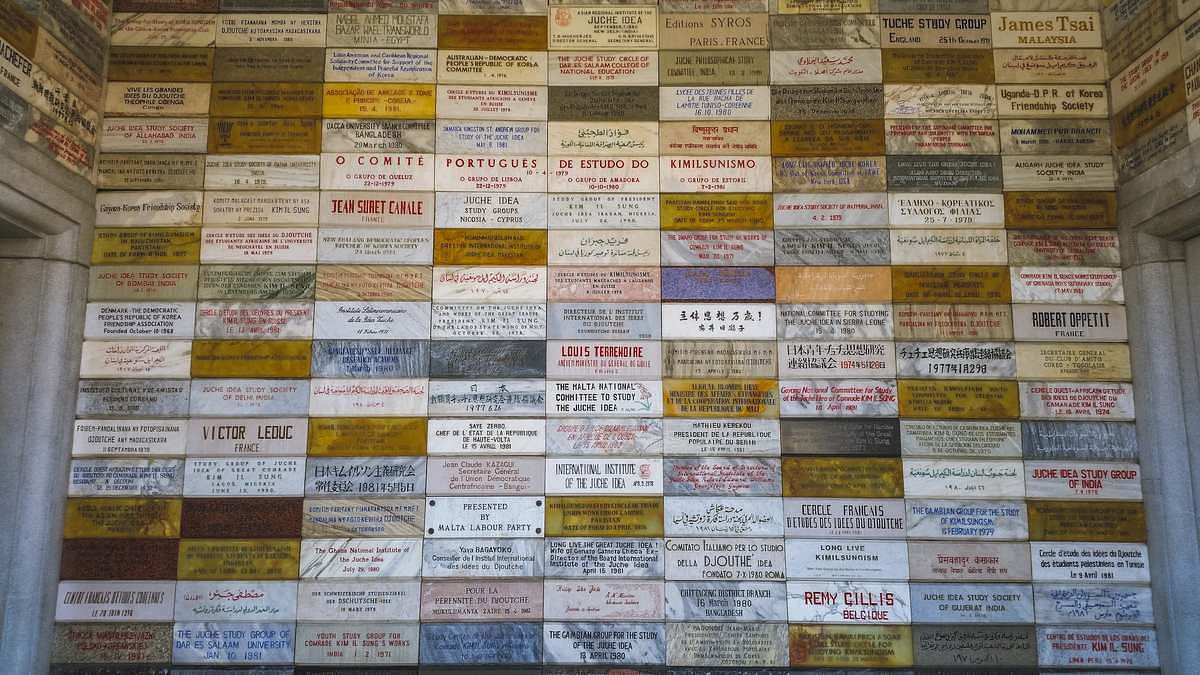
[ad_1]
But Gupta is not the only Indian to be impressed with Juche. It has captured the imagination of many others. The Asian Regional Institute of Juche Idea is headquartered in New Delhi and there are multiple ‘study circles’ across the country.
While South Korea’s Hallyu wave, driven by K-pop and K-dramas, has been on the rise in India in recent years, a smaller yet devoted following has existed for North Korea’s Juche ideology here for decades.
In fact, Juche had adherents in India as early as the 1960s, when the ideology was still being established by Kim Il-sung, the first premier of North Korea’s authoritarian regime, which has gripped power for three generations.
Gupta is the third generation from his family to be involved in the study of Juche. The JPSCI, in fact, was formed in 1965, years before Juche became North Korea’s ‘official’ ideology.
He told ThePrint that his late grandfather MR Gupta used to teach English to DPRK embassy officials, who introduced him to Juche. It sparked an interest in him that was passed down to both his son and grandson.
“My father, the late Anil Gupta, was a journalist. He was fascinated with Juche philosophy and started publishing a weekly newspaper covering important news from the world along with news from DPRK. The paper, Indian and World Events, used to go to DPRK through diplomatic bags,” Gupta added.
The importance of Juche in North Korea is evident in the frequent use of the term by the state media, whether it’s praising the “Juche-based” tractor industry to the “Juche-oriented army”. There’s even a Juche calendar system that starts from 1912, the year of Kim Il-sung’s birth. The year 2023, for instance, is Juche 112.
While the presence of Juche enthusiasts in India might be seen as part of relationship-building activities between the two countries if they had strong economic ties, this is not the case. In 2022, bilateral trade, including imports and exports, between India and DPRK amounted to just $4.25 million— just a fraction of India’s total global trade of $1.165 trillion that year.
So, what is Juche all about, and how has a devoted community grown around it in India?
Also Read: K-pop to K-dramas, there is a new K in the life of Indians – it’s Korean language
Philosophy vs propaganda tool
Juche has earned various labels over the years — from a political ideology to a philosophical doctrine to a propaganda instrument.
But no matter how one interprets it, Juche stands as a resounding “nationalistic national rallying cry” for North Korea, according to an Associated Press analysis. Even amid crises such as the deadly famine of the 1990s and economic sanctions linked to DRPK’s nuclear missile programme, it is Juche that has provided comfort and a sense of stability.

For its fans in India, too, Juche means many things. To Gupta, for instance, Juche’s guiding principle is simply, “man is the master of everything and decides everything, with an emphasis on self-reliance and independence.”
To Subash Kaji Shrestha, the deputy secretary general of the Asian Regional Institute of Juche Idea (ARIJI), Juche is also about revolutionary leadership.
In a piece published in the ARIJI website, he extols “the leadership of party and leader over the popular masses” and the importance of “monolithic guidance”.
“The Juche-oriented socio-historical principle explains scientifically that the popular masses are the subject of social history and that the socio-historical movement is an independent, creative and conscious movement of the popular masses,” Shrestha further writes.
If what exactly this means is unclear, it can be chalked down to the nebulousness of Juche itself. This vagueness is strategic, points out the Associated Press analysis. The flexibility of its fundamentals allows Juche to shift in meaning and operate successfully as propaganda pushed by the government of DPRK, energising its citizens, while also helping to evade responsibility for economic mismanagement and justifying isolationism.
Debt, diplomatic smuggling, & ‘self-significance’
For all the lofty ideals of Juche, the principles of “self-reliance” and “independence” seem to have have been interpreted in some remarkable ways by North Korea and some of its officials.
Russian scholar Andrei Lankov describes how, in the 1970s, North Korea tried to rid its economy of dependence on Moscow and Beijing by borrowing heavily on the international market.
Lankov writes that not only were the funds squandered on ill-conceived prestige projects, Pyongyang also refused honour interest payments. Between 1979 and 1980, North Korea became the first Communist state to default, landing it with a huge debt of $600 million in principal and $1.2 billion in accrued interest by 2007.
This “debacle”, Lankov notes, “seriously damaged North Korea’s credit ratings”.
In addition, North Korean diplomats have been implicated in all kinds of smuggling over the decades, from alcohol, tobacco, and drugs in the 1970s to rhino horn and ivory in the 2010s.
Lankov suggests that these illicit activities may have been connected to North Korean missions overseas being required to adhere to the “self-reliance” principle, meaning that embassy officials had to generate their own funds to cover their expenses.
In the same book, Lankov provides a translation of the word Juche. The common understanding of the word in English is ‘self-reliance.’ This, he calls misleading. “A better translation would be ‘self-importance’ or ‘self-significance’,” he writes, “that is, the need to give primacy to one’s own national interests and peculiarities.”
Juche in India— societies, seminars for ‘world peace’
Juche study centres have existed in India for a long time. While the JPSCI was founded in 1965, the Asian Regional Institute of Juche Idea (ARIJI) was in operation before the 1980s, as evidenced by its plaque of honour in the Juche Tower in Pyongyang, which was installed on September 7, 1980.

The tower, a monument to the Juche idea, contains 82 tribute plaques from foreign supporters and Juche study groups.
A cursory glance at online images of these tribute plaques show numerous Indian societies dedicated to studying Juche. These include, to name a few, the Juche Idea Study Society of Allahabad India, Juche Idea Study Society of Patna University, Juche Idea Study Society of Bombay, Juche Idea Study Society of Delhi, Juche Idea Study Society of Gujarat, and the Aligarh Juche Idea Study Society.
It is also worth noting that the online images suggest there are as many or even more tribute plaques from Juche study societies in Pakistan.

According to JPSCI chairman Vipin Gupta, the organisation is not funded by the DPRK or its embassy in India. However, it does receive support from embassy officials who participate in events to promote Juche in India.
The JPSCI holds multiple events throughout the year, including seminars that aim to “promote world peace through emphasising the role of the individual and the importance of national self-reliance,” Gupta told ThePrint.
He claimed a diverse array of people actively participate in Juche events, including “doctors, advocates, professors, journalists, politicians, and businessmen”.
According to ARIJI website, Justice Vijender Jain, a former Chief Justice of the Punjab and Haryana High Court and chairman of the Uttarakhand and Haryana Human Rights Commissions is the “chief patron” of the organisation and former Delhi cabinet minister Mangat Ram Singhal is a “patron”.
A peek behind the iron curtain
Members of Indian Juche societies have occasionally been granted the opportunity to visit North Korea because of their dedication to the ideology.
For instance, Vishwanath, an Indian journalist and businessman and a former director general of the International Institute of the Juche Idea (IIJI) was instrumental in setting up the ‘International Kim Il Sung Prize’ in 1993 to honour those who contribute to and propagate Juche, even registering a council for the award in Delhi.
He reportedly visited North Korea in 1979 and met with Kim Il-sung, even going boating with him in an experience that left him overcome with “strong emotion”.
Similarly, when Gupta won his award, he too was able to get a peek behind the DPRK’s iron curtain, with his 2007 visit even being mentioned in a Financial Times report.
As he recalled his visit to ThePrint, Gupta’s admiration occasionally lapsed into the style of rhetoric favoured by North Korean state media.
“The common man in DRPK is totally committed to his leader, His Excellency Kim Jong-un,” Gupta said. “The DPRK is now witnessing rapid progress in the development of science and technology in the fierce flames of breaking through the cutting edge, as Chairman Kim Jong-il had wished.”
He claimed that this development stemmed from the launching of artificial satellites and because factories in the machine-building sector had been upgraded. The cities and villages in North Korea, he said, were “being turned into socialist paradises, adding remarkable successes to the building of a civilised socialist nation”.
Notably, on August 17, the United Nations Security Council (UNSC) discussed North Korea’s human rights situation for the first time in six years. Officials painted a grim picture, highlighting hunger, forced labour, and medicine shortages. Volker Turk, the UN High Commissioner for Human Rights, noted that many human rights violations stemmed from “increasing militarisation of the DPRK”.
In response, the Korea Association for Human Rights Studies (KAHRS) issued a press statement strongly denouncing the UNSC for “haggling about the human rights situation in an individual country, wantonly abusing its authority specified in the UN Charter, pursuant to the U.S. and its vassal forces’ sordid and despicable anti-DPRK human rights racket”.
The press statement was published by the Korean Central News Agency (KCNA), the state news agency of North Korea, and made available to ThePrint.
Meanwhile, despite his own praise of North Korea, Gupta clarified that there are a “large number of people” who do support Juche philosophy, but may not necessarily support the regime.
The history of Juche
Lankov explains in his book that Juche, an idea first mentioned by Kim Il-sung in a speech in 1955, remained on the margins of North Korea’s political ideology until the mid-1960s, when it was repackaged as the official ideology of the state.
In 1970, Juche was mentioned as the guiding principle of the Workers’ Party of Korea (WPK) alongside Marxism-Leninism. A decade later, in 1980, the sixth WPK congress deleted all mentions of Marxism-Leninism, leaving Juche as the sole ideology of the party.
This made North Korea the only country in the Communist Bloc that did not claim adherence to Marxism-Leninism.
Lankoov writes that Kim Il-sung’s son Kim Jong-il argued in an article in 1976 that Kimilsungism, of which Juche is the “quintessence”, was original and superior to Marxism.
According to a paper published in the North Korean Review by Kei Koga, an associate professor at the Public Policy and Global Affairs Programme, School of Social Sciences, Nanyang Technological University (NTU), Juche operates in North Korea through a mix of Korean nationalism and Confucian culture.
Koga argues that the Juche ideology combined with the Suryong (an ancient Korean term meaning ‘chief’) political structure helped to portray Kim Il-sung as the ‘Supreme Leader’ and encourage unity of thought and action among the people.
Kim’s rule was further consolidated through the construction of monuments and museums canonising his parents as “saints of the Korean revolution” and preventing outside political influence.
The veneration of Kim Il-sung, the “Eternal President” of the DPRK, is evident in many aspects of North Korean society today. For example, couples often celebrate their weddings in front of his statue.
The operation of Juche in both the social and political spheres of North Korea could perhaps be referred to as an example of what Karl Marx called the “opium of the masses”. And its powers are clearly not limited to North Korea.
(Edited by Asavari Singh)
Also Read: North Korea’s nuclear weapons cult shows Kim Jong-un won’t limit his ambitions
[ad_2]